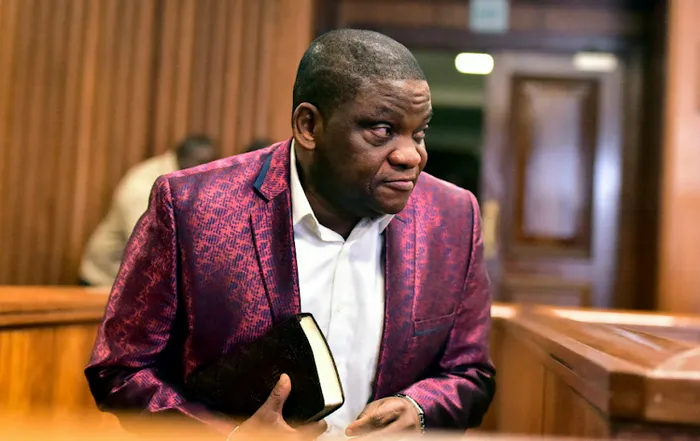Omotoso's attorney says 'case should be left to rest' as State seeks new appeal

Nigerian televangelist Timothy Omotoso left South Africa.
Image: Facebook
The National Prosecuting Authority (NPA) is gearing up for another round in its fight against Nigerian televangelist Timothy Omotoso’s rape acquittal — this time looking to take the battle all the way to the Supreme Court of Appeal.
On Monday next week, the case returns to the Gqeberha High Court, where the State will ask for permission to approach the appeals court in Bloemfontein to challenge parts of Judge Irma Schoeman’s ruling that cleared Omotoso and his co-accused of rape, human trafficking and racketeering earlier this year.
Omotoso's attorney, Peter Daubermann, said he would oppose the application.
He said the case should be left to rest.
The application is a standard legal procedure when the prosecution seeks leave to appeal.
In SA law, a party must first obtain the court’s permission to appeal a judgment, particularly when the trial has concluded.
In this instance, the Eastern Cape Public Prosecutions Department has filed what is known as an application for the reservation of questions of law.
This step allows the state to ask the court to consider specific legal questions arising from the trial — despite the case having ended — before taking the matter to a higher court for review.
If the High Court grants the application, it could permit the state to challenge particular legal findings made by the trial judge.
It could potentially pave the way for a fresh hearing at the appeals court in Bloemfontein.
Omotoso, along with his co-accused Lusanda Solani and Zukiswa Sitho, was acquitted in April after a lengthy trial that began in 2018.
The court found the NPA had failed to prove its case beyond a reasonable doubt.
It also criticised the state’s cross-examination of the accused, describing it as “poor quality".
The case involved 63 charges, ranging from rape and sexual assault to human trafficking and racketeering.
It stemmed from allegations that young women were recruited to work for Omotoso’s Jesus Dominion International church and were then sexually exploited.
This is the second attempt to appeal the widely publicised not-guilty verdict.
The state has had to rethink its strategy in trying to hold Omotoso accountable for the charges on which he was acquitted.
In July, Schoeman dismissed the state's request for a clarification of her judgment.
“The state is not entitled to request clarification of facts before applying for leave to appeal on a question of law,” she said.
But now retrying its hand at appeal, in court papers filed by Public Prosecutions deputy director Adv Joel Sesar, the state argued there were reasonable prospects that another court, notably the Supreme Court of Appeal, would find that Schoeman made "material misdirections on questions of law".
Sesar said the public outrage over the acquittal and the "seriousness of the crimes" were further reasons why the appeal should be heard.
The state’s application listed six key questions of law. These included whether the trial court assessed the evidence correctly, gave proper findings of fact as required by law, and handled evidence of similar acts meant to show a pattern of behaviour properly.
It also looked at whether the court dealt with claims of prosecutorial misconduct correctly and applied the elements of racketeering properly.
The appeal further questioned whether the court wrongly dismissed some complainants’ evidence for lack of corroboration, though there was other supporting testimony.
Sesar argued the trial court “did not employ the proper approach to the evaluation of evidence adduced in a criminal trial”.
He cited the landmark judgment S v Van der Meyden, which set out how courts must weigh all evidence before reaching a verdict.
He further said the trial court’s failure to provide detailed factual findings “unduly curtails the already limited right of the state” to pursue a review under the Criminal Procedure Act.
The state also insisted the evidence pointed to a pattern of sexual exploitation that should have been recognised as “similar fact evidence” showing a clear modus operandi.
“All or the majority of the complainants were transported from various places where they had first met accused number one to his houses where he allegedly sexually assaulted them,” the application read.
It added that assaults were repeated “over a long period of time and in respect of a considerably large number of complainants”.
In a different matter, Omotoso was arrested in East London on May 10 for contravening SA's Immigration Act.
The home affairs department had declared him a "prohibited person", making his presence in the country illegal.
However, during his court appearance on May 12, the East London Magistrates Court ruled that authorities had failed to bring him before the courts within the prescribed 48 hours.
As a result, the court released Omotoso on a technicality, finding that his detention was unlawful.
Following his release, Omotoso filed an urgent High Court bid to have his prohibited status reviewed.
The home affairs department, in turn, expressed its intention to challenge the court's decision.
It said the magistrate had erred in releasing Omotoso.
Omotoso has since left the country.
Cape Times